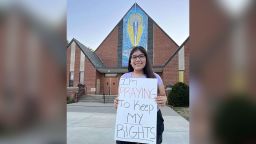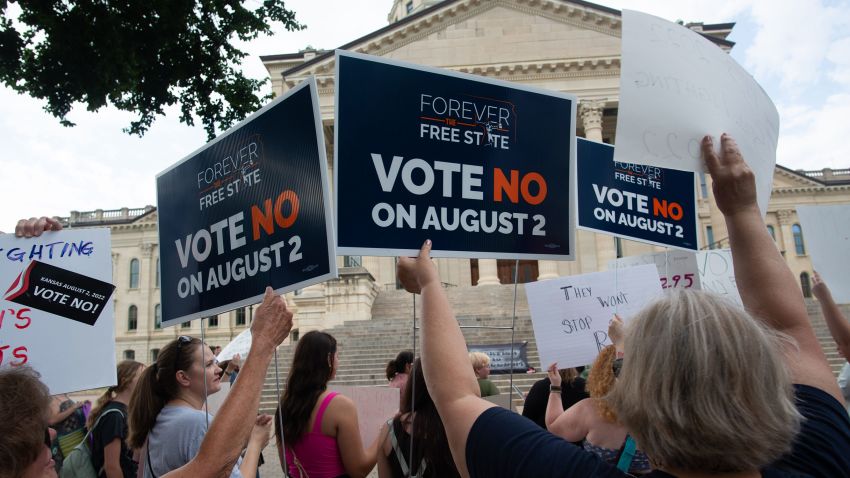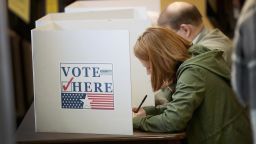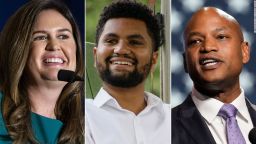Editor’s Note: Dolores Hernandez, a junior at the University of Missouri-Kansas City, lives with her family in Shawnee, Kansas. The views expressed in this commentary are her own. Read more opinion at CNN.
People sometimes wonder what it will take to get young people to the polls. Well, after the 2022 midterms, they no longer have to guess.
Place in front of us an existential issue that could determine our future. Give us the knowledge that we can have a say about issues that affect us with our votes, and we will turn out in droves.
As someone barely out of my teens, I’m supposed to be among the disaffected youth who don’t care about politics. But in my experience, there’s no such thing: Almost all of the people I know from my age group care deeply about some issue or the other.
For some of us, that issue is the environment. For others, it’s gun violence prevention – that was the case for Maxwell Alejandro Frost, the Florida activist who this week became the first Gen Z member of Congress.

In my case – even though it wasn’t technically on the ballot in Kansas this November – the abortion issue drove my vote. And that’s true for a lot of people in my circle.
My friends and I all know people who have needed to access abortion. After the Supreme Court reversed Roe vs. Wade, we sat around together and discussed the “what if’s” that could one day force us to face that awful decision. We all immediately understood the impact on our lives that an unwanted pregnancy or unplanned parenthood would have.
In August, several weeks after the Supreme Court decision to overturn Roe, Kansans voted on a measure that would have removed abortion rights from our state Constitution.
In some ways, Republicans’ move to put this measure on the ballot actually did some of us a favor: It helped my peers to connect the dots that voting is actually a way to bring about change – or a way to prevent an unwelcome outcome. Ultimately, 59% of Kansans voted ‘no,’ on a constitutional amendment that would have sharply curtailed abortion access in our state. More than 900,000 voters turned out – the largest primary in Kansas history.
And this past week, young people in my state turned out in force once more to cast ballots for the incumbent Democratic Gov. Laura Kelly – even without a ballot measure that would have stripped the right to choose out of the state constitution. That’s because Kelly has vowed to protect abortion rights while many Republicans in the state – including her challenger in the gubernatorial race, Derek Schmidt – are determined to take away Kansans’ right to choose.
Tuesday’s vote was round two of an ongoing battle, and the choice couldn’t have been starker: Turn out to vote and you might actually retain your access to abortion services. Stay home, and those rights would be taken away. For two of my friends in their mid-twenties, this was the issue that got them to the voting booth for the first time in their lives.
I never felt more proud to be a Kansan than I was back in August, when my state overwhelmingly voted to protect abortion access. The issue mobilized thousands of young voters like me to make our voice heard. And the looming threat of a nationwide abortion ban has helped keep the issue front and center for a lot of us, as did Kelly’s reelection fight. So I guess we have Sen. Lindsey Graham of South Carolina and his bill to restrict abortion nationwide to thank for helping ignite the continued interest and activism among people in my age group.
Speaking for myself, even without abortion as a motivating issue, there was never much of a question that I would go to the polls on Tuesday. Voting is a very big deal in my family.
When I turned 18 two years ago and became eligible to vote, my mother, dad and sister all accompanied me to the polls as I cast my very first ballot. My parents have always been avid voters, because my brother has spastic quadriplegic cerebral palsy and relies on social services. They understand that his access to services depends on who is in political office. My dad and my sister, who’s currently in law school, sat down with me to go over every candidate and issue beforehand, to make sure I understood who I was voting for.
I didn’t know how fortunate I was for that guidance: When I started college two years ago, I was surprised by how many of my peers didn’t know how to vote or felt indifferent about elections.
But being uninformed about the election process is not the same thing as not caring about the issues that affect our lives. Many of the great social movements have been driven by young people, from the peace protests of the 1960s, to the youth driven, anti-gun violence activism after the Parkland shooting. I view those of us who have become activists around abortion rights as the next iteration of these youth-led movements.
When I reached out to my friends ahead of August’s ballot measure on abortion, I found many of them weren’t even registered to vote. Some had never even voted in their lives. As vice president of my school’s Latinx Student Union, I’ve met many students whose parents couldn’t vote and couldn’t teach their kids to vote like my parents had done for me.
Ahead of this month’s midterm election, my university’s Latinx Student Union helped register voters and distributed information they needed about the candidates’ positions on abortion access. The flurry of misinformation spread by the anti-choice side confused many first-time voters, and I knew I had to share accurate information.
My sister and I, and other student activists in Kansas, are in good company. Youth voter activism is growing nationwide. More people under the age of 25 registered to vote this midterm than in 2018, according to CIRCLE Research at Tufts University.
Between August and September of this year, young women accounted for 54% of new registered voters – a change from most years, when voter registrations have been fairly evenly divided by gender. I’m sure that the abortion vote has a lot to do with that.
Kansas is one of the states where the increase in the youth vote has been highest, along with Michigan, a state where an abortion referendum like the one we had in Kansas was on the ballot this week. It came as no surprise to me that polling stations on Michigan college campus saw long lines to vote. Young people there are feeling the same urgency that we felt in our in Kansas during August’s vote on abortion.
Kansas saw a sharp spike in youth voter registrations leading up to the primaries and the abortion ballot measure. Our state is one of only nine where registrations among 18- and 19-year-olds surpassed the levels of November 2018, the last non-presidential national election.
Gen Z voters like me were a big part of August’s vote. Since then, discussions about voting and abortion still dominate the conversations on campus. The victory for abortion rights is empowering students to discuss their views on a range of issues. Now students on campus are talking more about healthcare, education funding and immigration. The abortion debate became a foot in the door for what I believe will be a lifetime of activism for many of us.
I believe the Kansas abortion referendum sent a strong message to young voters across the country: Your vote has the power to decide an election. The success of this message is reflected in the victories for abortion access ballot measures in Michigan, Kentucky Vermont, and California.
The vast majority of Americans don’t support abortion bans and won’t support candidates who do. And while we can’t know for sure yet, I have a feeling it was youth voters who drove key victories for abortion ballot measures and for pro-choice candidates around the United States.
Gen Z voters have grown up in a country that always protected our bodily autonomy. Having it stripped away, by individuals who don’t represent the vast majority of us, woke a lot of us up to the importance of voting. That’s a lesson we won’t soon unlearn.






